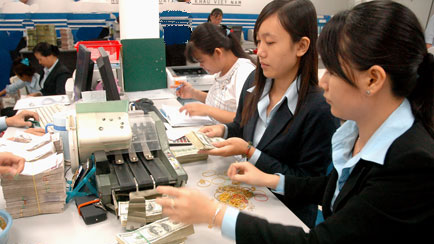Vietnam in top 10 overseas remittance recipients
(VOV) -Vietnam is expected to receive US$11 billion in overseas remittances in 2013, ranking it among the World Bank’s (WB) 10 leading remittance recipients in the world.
Vietnam’s remittances have consistently increased despite global economic difficulties, demonstrating the close link between expatriates and their relatives in the homeland.
Listed in top 10
In 1994, overseas Vietnamese living in 16 countries used Western Union to send their remittances back home. Expatriate Vietnamese communities have established themselves even further afield since, with remittance points of origin growing to their present 200 countries and territories.
The World Bank’s 10 biggest remittance recipients for 2013 are India, China, the Philippines, Mexico, Nigeria, Egypt, Pakistan, Bangladesh, Vietnam, and the Ukraine. Overseas remittances are often essential fuel for home countries’ economic growth.
Approximately four million Vietnamese people are living abroad, including 400,000 guest workers employed in 101 countries and territories. If each guest worker sends US$2,500 back home annually, the revenue could amount to US$1 billion per year.
The US, Canada, and Australia remain the leading points of origin for the majority of Vietnamese remittances. A large number of expatriate Vietnamese want to open businesses in the homeland, especially in agriculture and tourism services.
 |
Fighting ‘brain drain’
About 400,000 Vietnamese experts and intellectuals holding Masters and PhD degrees are working overseas, primarily in science and advanced technology sectors. The State Committee for Overseas Vietnamese Affairs reports around 10,000 Vietnamese people are employed in the US tech centre Silicon Valley.
Returning Vietnamese experts and intellectuals are usually retired already or about to be so, and students studying overseas are often enticed to stay by the lure of higher wages and more opportunities. Avoiding brain drain is thus a pressing issue, as important to national development as maintaining remittance levels.
Professor Nguyen Lan Dung says the average monthly salary of a doctorate degree holder working abroad is US$3,000, much more than the Vietnamese level of US$150. Vietnamese talent is not rewarded in Vietnam itself, he confides.
Professor Dung also says Vietnam’s many research institutes struggle to meet international standards.
A number of students report minimal opportunities to apply what they have learned upon returning to Vietnam. The loss of these high-quality human resources cuts deep.
The Vietnamese Government has launched initiatives to encourage expatriate experts, professionals, and students to return to work in the country. The “talent attraction’’ programmes have yet to enjoy any significant success.
Professor Dao Trong Thi, Chairman of the National Assembly Committee for Culture, Education, Youth, and Children, says underdevelopment prevents the talented from using their knowledge and furthering their careers.
Scientists working in foreign countries can still contribute—directly or indirectly—to Vietnam’s progress. Professor Ngo Bao Chau, who works in Vietnam part-time, thinks it is important to link domestic mathematics with the international academic world.
Professor Thi hopes the number of returning expatriate scientists will rise during the next 10 or 15 years of Vietnamese development.
The best way for the Government to attract more overseas remittances is ensuring the funds are used wisely and efficiently to propel the national construction process.
